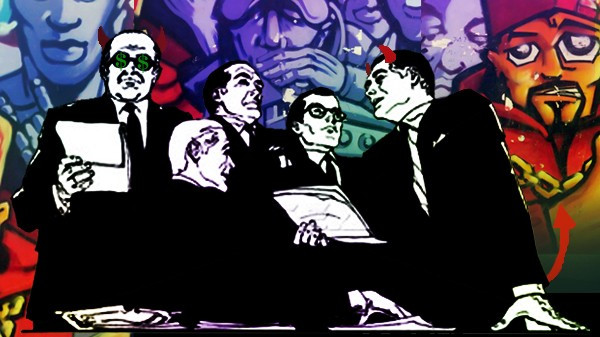
CARTOON/SILICON VALLEY DE-BUG
Editor’s note: Hop Congress has partnered with the People’s Tribune. For more information, contact hiphopcongress.org
SAN JOSE, CA — Structurally, technologically and culturally speaking, there is no “music industry” any more. There is also no “movie industry” any more. Those two things have been consolidated into a more generic and all encompassing, “entertainment industry.”
Technically, the entertainment industry is now a sub-division of a much larger and more insidious industry known as the “telecommunications industry.” This is the delivery system under which all media and cultural distribution is being consolidated.
When I talk about the industry, I’m not talking about the hardworking artist or the record producer who really believes in what he or she is doing. I am talking about the corporations and colonial structure that has been looting and pillaging cultural production since art, music and culture could be commodified. I am not talking about DMX, T.I. or Kendrick. I am talking about the CEO’s and large stockholders of Warner Bros, Comcast, Disney, and the other rapidly consolidating future monopolies of media and global cultural distribution. I am talking about the larger imaginary structures that are spying on us through our Youtube surfing as we speak. Artists are not the problem.
In fact, as much as the world fails to really engage this truth, artists are the victims. And so are the people who benefit from healthy culture.
It is economically important for our current corporate structure to ensure that you do not see yourself in the cultural production and exchange process, because, by separating us from the process, someone can determine and direct who and what is considered legitimate and valuable in the realm of culture. This way, not only can the creative thought of a society can be controlled, but then the rewards of culture can be organized and harvested by those who may or may not have even planted the crops. The reason it is ideologically important to separate people from the process of cultural production and exchange is because art is human. Culture, itself, is how we socialize, interact with and collectivize our understanding of humanity. Those who control culture, control definition. Those who control definition, control determination.
In general, our society is isolated from art and artists, even though our clothes, logos, commercial jingles and pop hooks tell a different story. In the industry, artists, in general, are considered incapable of managing their own affairs. This is often chalked up to their inability to think in structured terms. While generally accepted as a truth, this is both historically inaccurate and extremely dangerous.
The struggle of the artist of America is the struggle around the means of ownership and distribution of cultural production. The contradiction between the origin of Hip Hop and the current state of on coming fascism is the question of who will wield the power of cultural democracy and self-determination. Hip Hop, in it’s instinctive rejection of corporate domination, both in the industry and movement work was a natural target of the fascist state.
A culture that, when healthy, challenges the institutions of capitalism and colonialism by virtue of it’s very existence, can’t just be allowed to exist untampered with.
Shamako Noble is Emcee, Executive Director of Hip Hop Congress and serves as Secretary of Culture in the General Welfare Branch of the Green Shadow Cabinet of the United States. For the complete article visit
siliconvalleydebug.org/articles/2013/09/05/pedagogy-hip-hop-media-consolidation-black-manhood-and-art-america
Hip Hop’s fight for a healthy culture challenges capitalism
Latest
Free to republish but please credit the People's Tribune. Visit us at www.peoplestribune.org, email peoplestribune@gmail.com
The People’s Tribune brings you articles written by individuals or organizations, along with our own reporting. Bylined articles reflect the views of the authors. Unsigned articles reflect the views of the editorial board. Please credit the source when sharing: ©2024 peoplestribune.org. Please donate to help us keep bringing you voices of the movement. Click here. We’re all volunteer, no paid staff.


Excellent article! “The struggle of the artist of America is the struggle around the means of ownership and distribution of cultural production.” So very true! Thank you, Shamako Noble.